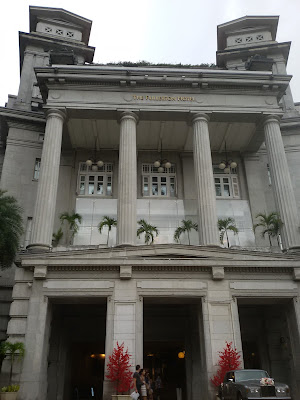It paralyzes the sight
 |
| To Greek mythology, Amaryllis is a beautiful-never-existed-before flower which Alteo desired most, made of blood from a maiden's heart pierced by 30 golden arrows one for each day in a month |
Beauty they said, the cause.
I watched the second chapter of Mishima-sensei’s biography movie by Schrader last weekend and now I frame the word ‘beauty’ to refer to human physical reality, a “physical presence” Mishima-sensei said. The idea that not only pleases the eyes but also delights the hands.
But this delightful feeling from the touching sense gradually fades away as the age rots the beauty.
The attributed meaning of beauty has been too narrowly explained here but it has been publicly acknowledged. There are too few people who agree that ‘beauty’ has an embedded meaning of violating their sight or repugnant to be touched. So, it has got to enchant the eyes and the skin of the palms.
Under the title of "Art" as the second chapter of "Mishima: A Life in Four Chapters (1985)," Mishima-sensei entailed the essence of beauty, sounded as below:
“These damn legs. I pay too much attention to my face ... but what about my body? If only I were more muscular... like a matador ... then my whole body could be my face.” Osamu-san, Kyoko’s House.
In the movie itself, there was a part of Mishima-sensei thought on what beauty was and what he feared most on his 'beauty':
“When you look in the mirror, the homosexual like the actor sees what he fears most ... the decay of the body.” Narrator acted as Mishima-sensei.
The lover: “Tell me. I must know.”
Mishima-sensei: “Both you and I have a strong sense of aesthetics. When you look in the mirror, you see beauty. Therefore, I can’t even look at myself. So ... don’t make jokes like that again.”
I am the woman who hasn't found her own definition of and desire of 'beauty,' unlike what Mishima-sensei's believed, “Men wear masks to make themselves beautiful. But unlike a woman’s, a man’s determination to become beautiful is always a desire for death.”
However,
I prefer the beauty over the non-beauty.
And so I am restless the non-beauty that hunts me when another year comes.
Laugh me for being the-too-narrow-too-shallow thinker.
I, therefore, am still puzzled whether I comprehend the line of:
“True beauty is something that attacks, overpowers, robs, and finally destroys.” ―Mishima Yukio
The attributed meaning of beauty has been too narrowly explained here but it has been publicly acknowledged. There are too few people who agree that ‘beauty’ has an embedded meaning of violating their sight or repugnant to be touched. So, it has got to enchant the eyes and the skin of the palms.
Under the title of "Art" as the second chapter of "Mishima: A Life in Four Chapters (1985)," Mishima-sensei entailed the essence of beauty, sounded as below:
“These damn legs. I pay too much attention to my face ... but what about my body? If only I were more muscular... like a matador ... then my whole body could be my face.” Osamu-san, Kyoko’s House.
In the movie itself, there was a part of Mishima-sensei thought on what beauty was and what he feared most on his 'beauty':
“When you look in the mirror, the homosexual like the actor sees what he fears most ... the decay of the body.” Narrator acted as Mishima-sensei.
 |
| A conversation on 'beauty' between the lover and Mishima-sensei |
Mishima-sensei: “Both you and I have a strong sense of aesthetics. When you look in the mirror, you see beauty. Therefore, I can’t even look at myself. So ... don’t make jokes like that again.”
I am the woman who hasn't found her own definition of and desire of 'beauty,' unlike what Mishima-sensei's believed, “Men wear masks to make themselves beautiful. But unlike a woman’s, a man’s determination to become beautiful is always a desire for death.”
However,
 |
| Beauty is not. Beauty is the desire. |
And so I am restless the non-beauty that hunts me when another year comes.
Laugh me for being the-too-narrow-too-shallow thinker.
I, therefore, am still puzzled whether I comprehend the line of:
“True beauty is something that attacks, overpowers, robs, and finally destroys.” ―Mishima Yukio

Comments
Post a Comment